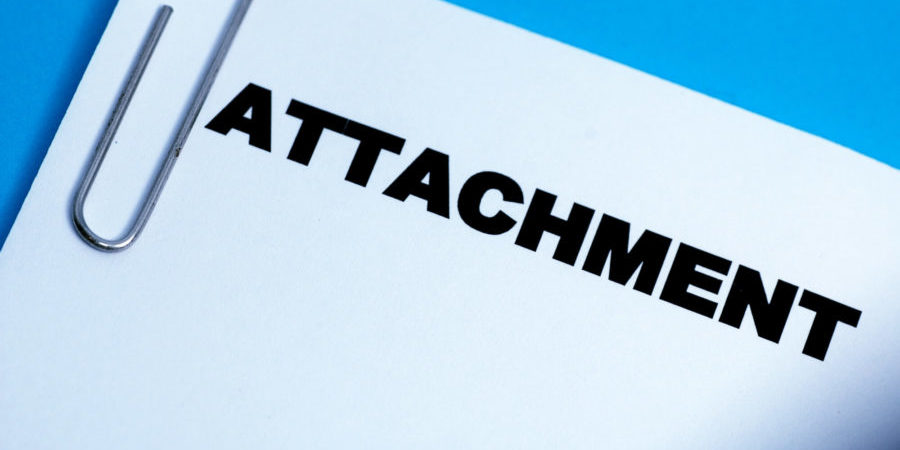
Please find attached or Please find the attached? Many people want to know the correct way of mentioning email attachments. So, let’s find out the correct way to mention email attachments.Here are different ways people write to mention email attachments.
Please find attached or Please find the attached? Many people want to know the correct way of mentioning email attachments. So, let’s find out the correct way to mention email attachments.Here are different ways people write to mention email attachments.
Example #1: Please, find attached the report you asked for yesterday.
Example #2: Please, see the attached report for the budget estimate.
Example #3: Please, find the report attached.
In the examples above, there are two key components:
#1 – Position of the adjective “attached”
#2 – Use of the article “the”
Generally, an adjective is used before the noun in order to denote its attributes. For example, when you say “he’s a talented writer”, talented denotes the attribute of the noun (writer). However, in some cases, they use adjectives after nouns, e.g. “I want someone special”. When adjectives are used after nouns, they are known as “postpositive adjectives”. In modern business communications, the use of postpositive adjectives is rare. In fact, they are used to invoke a particular emotion. For example, “there are places unexplored”.
Therefore, some grammar purists wouldn’t approve of the following usage:
Please, find the report attached. (attached is a postpositive adjective here)
The other important point is the use of the article “the” in the examples above. As you already know, the article “the” is usually used to specify an object. Look at the two examples below:
#1 – I saw a cool bike yesterday.
#2 – I saw the cool bike again earlier today. (use of “the” denotes a specific object)
Based on this grammar rule, Example #1 looks perfectly fine since the email sender is mentioning “the report” which the receiver has asked for.
In other words, the usage “find attached the report…” sounds acceptable in such a context.
Therefore, if you want to use “find attached the report”, make sure you add something that makes sense, e.g. “you asked for yesterday”.
Find the Attached vs See the Attached
Some people believe it should be “see the attached…” instead of “find the attached…” as using “find” might mean “to search for” in email communications. The notion is actually debatable since the word “Find” has several meanings. However, if you want to be safer, you can go with Example #2: “Please, see the attached report for budget estimate”. In this example, the use of article “the” is appropriate and the attached is used as an attributive adjective. In other words, it’s the most acceptable format of mentioning email attachments.
Variations of Example #2:
✅ Please, find the attached file for a better understanding.
✅ Please, find the attached file as per your request.
✅ Please, find the attached file you asked for.
✅ Please, find the attached file relevant to the case.
Some more examples:
Please find the attached file for your review
Please find the attached file for your request
Please find the attached file you requested
Please find attached the file you have requested
Please find the attached file for your reference
Please find attached file for your kind reference
Please find the attached file for your approval
Please find the attached file and let me know
Please find the attached file for my resume
Please see the attached file for my resume (informal)
Please see the attached file for details (informal)
Please see the attached file for your perusal (informal)
Please refer to the attached file for your perusal
Please refer to the attached file for your kind perusal
Please find the attached quotation for your perusal
Please find the attached invoice for your payment
Please find the attached file in this email
Please find the attached file herewith
Please find the attached document for your review
Please find the attached document for your records
Please find the attached documents for your signature
Please Find Attached vs Please Find Enclosed
Many people wonder if using the word “enclosed instead of “attached” would denote a more formal tone. But there’s nothing like that. “Enclosed” is used for physical mails whereas “attached” is appropriate for emails.
Alternatives to “Please Find Attached”
- The attached diagram shows . . .
- The attached spreadsheet contains . . .
- When you review the attached proposal, you will notice . . .
- As promised, I have attached a revised . . .
- Please let me know if the attached draft . . .
- Here is . . .
- Enclosed are . . .
- Attached is . . .
- We have enclosed . . .
- I have attached . . .
- The attached proposal includes . . .
- The enclosed document shows . . .
- Please see attached…
- Please review the attached diagram . . .
- The attached spreadsheet covers . . .
- Please use the enclosed envelope to . . .
So, remember the following rules for email attachments:
✅ “Please, find the attached file,” is more common in modern business communications. However, it’s NOT the only acceptable format.
✅ Always add context to the above format. For example, say “Please, find the attached file you requested yesterday.”
✅ When you don’t want to specify any particular file, avoid using “the”. You can simply write, “Please, find attached.” or its abbreviated form: PFA.
✅ “Attached” is the correct word for electronic communications. Enclosed is used for physical mails where envelopes are used. Don’t get confused.
✅ “Find” has more than one meaning. It doesn’t really mean you’re asking the recipient to search for something that is lost.
The rules of the English language are so complex that we often find many common errors in uncommon places. The problem is often compounded for the non-native English speakers who usually learn the language by assuming many things to be correct. Therefore, we see many people resorting to wrong usages in their everyday interactions.
Hopefully, you’ll find this guide useful.

Anna
Hi, is there any chance that one of the sentences above is missing ‘the’?
The sentence: Please find attached file for your kind reference
Thank you in advance for your feedback.
With kind regards, Anna
Susanta Kumar Sahoo
Hey Anna,
Thanks for stopping by!
I think it should be: Please, find the attached file for your kind reference!
So, yes, the article is missing in your given sentence.
Hope this helps.
Cheers,
zaphand
how about “Herein attached catalogues for your reference? is it ok or informal?
Susanta Sahoo
I’d prefer herewith to wherein. Moreover, I’d place it after next to “Attached” since it’s an adverb. So, essentially, I’d write, “Attached herewith the catalogues for your reference!”.